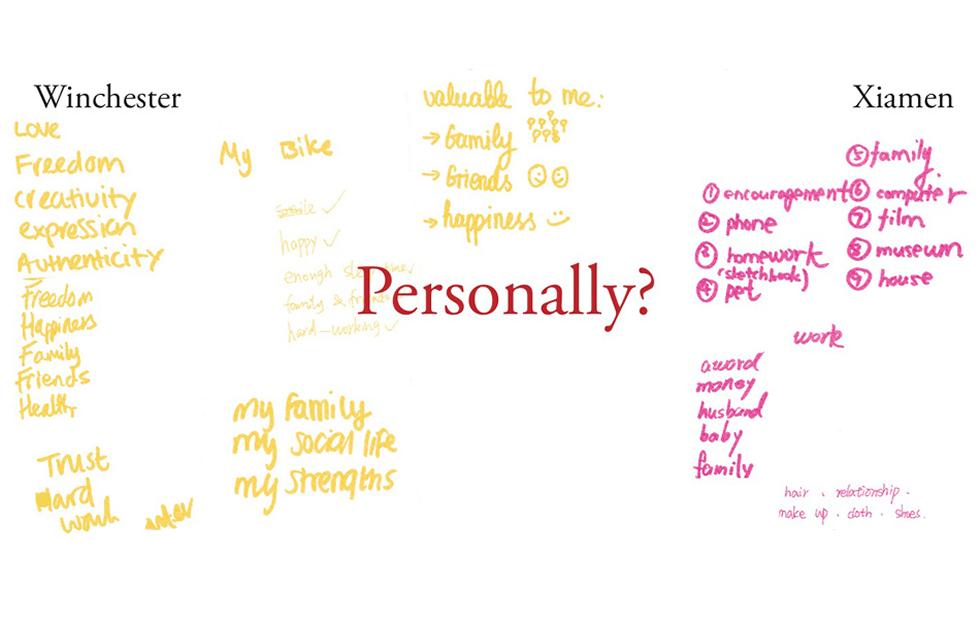Transcending Transaction was a 2017 collaboration between staff and students of Winchester School of Art, Xiamen International College, and Paris Smith LLP. Paris Smith is one of the largest law firms in Central Southern England, with offices in Southampton and Winchester and this was the year of their 200th Anniversary.
Money has always been a necessary commodity within society. Its historical development is well-documented and ranges from crude forms such as beads and metal objects, to early coinage around 700BC, to the more recent introduction of cheque books, credit /debit cards — and then on to digital payment methods and the more risky currency of bitcoin.
This project looked at the future of money from a millennial’s perspective and asked how transactions might be undertaken in the future, in the light of the huge changes in technology and the increased role of digital payment methods. The project explored what money means to the School’s students now and how they may view it in the future. How is digital money branded, how does it look and identify itself?

The student workshops were designed to address some of these questions took place with Graphic Design students the Xiamen International College, part of Xiamen University in Southern China, on the 20th April 2017. The same exercise was also delivered to students from Winchester School of Art on the BA Graphic Arts programme on the 3rd May 2017.
The Brief:
It is now your task to start to project forward and view how this technological momentum might continue and become more defined with transactions and money. Consider the progression and developments that have occurred to date and review how money has evolved. Start to define the future of financial transactions and how the interaction between vendor and buyer might take place. Your solutions might not be bound by traditional terminology, graphics, numerations or physical attributes. Aim to define and reinvent what we know and understand. Be ambitious with your concepts and final outputs.
The first part of the workshop (WSA) looked at unlocking quick thoughts and provides possible avenues of thought regarding icon generation for the new unknown system of transactions. I set out a list of rules for the workshop, in which the students had 20 seconds to simply draw on post-it notes the words I gave them. The time stipulation would force them to provide a quick solution. The second part was designed to uncover cultural similarities and differences between the two sets of students. China is currently in a more developed state with its digital currency. Almost every student who undertook this workshop in Xiamen does not carry cash with them and thought it was around six months or so since they had used coins or notes in their everyday lives.
Within the first phases of the workshop we documented the students perception of what ‘transaction’, ‘value’ and ‘worth’ might look like for possible avenues of research which could form a sound foundation for the generation of an icon or logo for future systems of transactions. These quick and spontaneous drawings in many places have a visible generic thread which connects our understanding and visual language as humans, devoid of any potential cultural differences.
Some observations gleaned from the drawings:
- Responses to ‘Worth’ range from materialistic goods, such as clothing tags and sparkling diamond rings, to happiness within a relationship or family life.
- The ‘Exchange’ drawings are all symmetrical. Whilst one example shows a triangle being exchanged for a square, the drawings depict clear themes of fairness and balance.
- Houses also feature throughout as safe places, providing shelter and protection, as well as having great value.
- Graphic devices, such as arrows, are used to show movement within the image.
- Money is often depicted as a dollar sign, whilst the yuan or pound sign rarely appear.
- When drawing the act of ‘giving’, we see that the majority of responses depict the ‘giver’ on the left and the ‘receiver’ on the right.
After analysing our findings from the word work- shop, we started to think about more focussed factors around the themes of value and worth: The aim of this section is to map what we understand worth to be and how we value this?
To do this, the students were asked to self-assess and honestly reflect upon what has ‘value’ or ‘worth’ in the following categories:
1 Personally (you)
2 Societally (the people around us)
3 Nationally (our country)
4 Globally (the world)
5 Physically
6 Scientifically
7 Spiritually
To conclude the workshop the students were asked to project into the future and revisit what we had covered in the earlier phases to ignite ideas and creative direction for their predictions.

The drawing on the left (click to expand) shows six solutions; concepts that came independently from both the UK and Chinese students. All seem to be potentially viable solutions but also currently fall outside our natural next step of transactions, be it technologically, scientifically or ethically. We are looking for the next step to be counterfeit-proof, easy to use and not reliant on gadgets. The students point out that our bodies fulfil this demand and present a plausible case: within the next 5 to 10 years the human body could be the device to complete transactions of the future.















